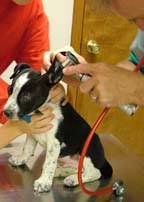 Nothing could be scarier than finding dog parvo disease symptoms in your puppy. Many people have heard of the parvo virus and equate it with danger but do not know much about it.
Nothing could be scarier than finding dog parvo disease symptoms in your puppy. Many people have heard of the parvo virus and equate it with danger but do not know much about it.
Owners will often notice the lethargy or loss of appetite in their puppy and mistakenly attribute it to something else. However, by the time an owner discovers their puppy’s bloody diarrhea, the viral illness has devastated the lining of the dog’s intestinal tract.
Since there is no way to gain sustenance through the lining of the intestine, a puppy can become dehydrated and go into shock. Even with emergency medical care from a vet, it is unlikely anything can be done. This is a scary, heart breaking way to learn about the parvo virus.
Parvo Disease in Dogs – The Cause and What Can be Done?
The responsible dog owner is one that chooses to research the symptoms of parvo in dogs ahead of time. What he or she will find is that parvo is a virus that almost always strike puppies because of their still forming immune and digestive system (very important). Older dogs that come down with parvo are generally those that have an immune system that has been compromised.
There are supposed vaccines for parvo but are hardly ever effective and often cause more harm than good. Most dogs are infected by other carriers of parvo; yet it takes up to ten days before any real symptoms manifest. Plus, the disease can languish in a vast range of temperatures in an environment for months at a time. Along with blocking food absorption, bloody stool and loss of appetite, a puppy’s heart can be affected as well.
The important thing to consider with parvo is that it is a virus and a virus cannot be cured. The best that can be done with dog disease parvo symptoms that are in full swing is to offer a rigorous treatment of IV fluids or antibiotics. Keep in mind that there is only a fifty-fifty chance of recovery. Therefore, the real answer to dealing with the parvo virus is prevention.
How to Prevent Parvo in Dogs
As parvo tends to be a disease that is as widespread as it is tough, many professionals recommend:
- keeping known carriers of parvo away from puppies and other dogs.
- Immediately removing stools from the yard
- Disinfect food, water dishes, bedding and kennels with a solution of four ounces bleach in one gallon of water; bleach is one of the few readily available cleaners that can kill the parvo virus
One Powerful Way to Prevent Dog Parvo Disease
There is also another preventative measure that very few dog owners know about and that is diet. While many dog owners understand that parvo attacks puppies because of their underdeveloped immune and digestive systems, what they don’t understand is the battering a young digestive system takes with commercial dog food from cans and packets.
Canned and kibble pet food is essentially fast food for dogs with all it’s health drawbacks. Along with being rendered from dead, disabled, diseased and dying animals – known as the 4-D’s – commercial dog food also contains a list of approximately thirty different chemicals and preservatives in concentrated amounts. Not only do the chemicals assault a young pup’s immune system, it easily wears down the digestive tract making it that much easier for dog parvo disease symptoms to flourish.
Just the opposite, a natural raw diet that the canine system was developed to thrive off only strengthens the immune system and digestive tract making it much harder for dog parvo symptoms to flourish. This is why puppies on a natural diet of fresh food rarely have trouble with the parvo virus. Feeding a natural diet from six weeks old is the foundation to securing an optimal immune system in your puppy.
Please Read Part Two As I Believe This Is Very Important For Your Puppy – Not Just For Parvo But For Real Health Lifelong!



